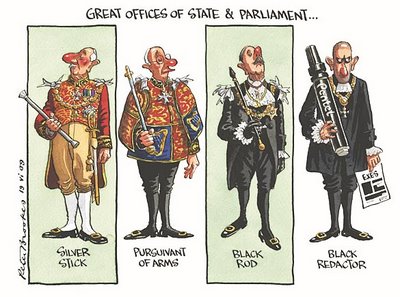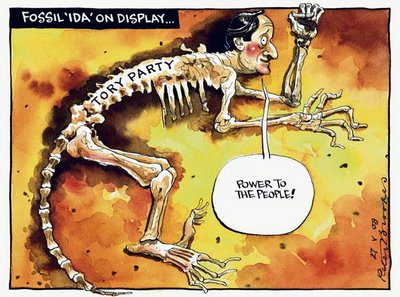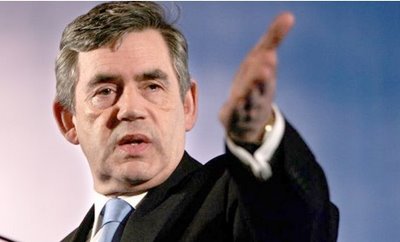The same old new politics.
The mood was, and still is, profoundly anti-politics. It isn't anger directed at one political party, but at politics itself, which is why Cameron's attempt to try to associate Gordon Brown directly with those MPs who have been charged with false accounting is unlikely to succeed. It also overlooks that even though no Conservative or Liberal Democrat MP was charged with a criminal offence, of those who had to pay back the most, 5 of the top 6 were Conservatives, including Liam Fox, Cameron's defence spokesman. As also previously argued, the attempt, mainly by politicians themselves as well as the ex-broadsheet media excluding the Telegraph to turn the anger into a case for constitutional and parliamentary reform also seemed to miss the point of the rage: those who wanted the equivalent of heads on pikes or an immediate general election weren't interested in slow and steady changes to fix how parliament works; they just wanted the MPs who had abused their expenses out. That also hasn't changed over time, and while Cameron is to be commended for keeping up the pressure for change, it's hardly likely that many votes for the Tories are going to be picked up on the back of reforming the current lobbying system.
It's difficult not to think that Cameron personally attacking Brown might have something to do with Brown's mentioning of he who must not be named: Lord Ashcroft. Ashcroft is also the spectre hanging over Cameron's entire speech: he wants anyone sitting in parliament to be a full UK taxpayer in the United Kingdom, yet he can't even confirm that the deputy chairman of his party is just that. He wants to "shine the light of transparency on lobbying in our country", yet if you donate £50,000 a year to the party you can join "The Leader's Group" and gain personal access to "David Cameron and other senior figures from the Conservative Party at dinners, post-PMQ lunches, drinks receptions, election result events and important campaign launches".
The entire speech is one that just screams of either never coming close to being implemented or coming back to haunt them. At four separate occasions he claims that "we are a new generation at ease with openness and trust". Really? Would this be the same Conservative party that seems to be imposing top-down control on MPs and prospective MPs use of blogs and social-networking sites? This is a party that even as it denounces Labour's past use of various spin doctors employs the likes of Andy Coulson and Steve Hilton, the former accused at an employment tribunal of leading the bullying of a journalist who suffered from depression. It's an easy allusion to make, but it really is all so reminiscent of Tony Blair: the repetition, the claims of being entirely clean, a new break, yet even while it sounds good, it's next to impossible to believe almost any of it. In that sense, it's Blair at his very worst: trying desperately to convince of his good intentions whilst failing to do just that. Even Blair at his worst though wouldn't have made such stonking great errors as talking up parliament as formerly being an unimpeachable institution once famous for "radical legislation, elevated debate and forensic scrutiny of laws"; has it really been anything like that since the 60s? Nor would he have made the mistake of claiming that a monologue exists where parliament talks and the country listens; parliament may well talk but the country either doesn't listen, or as the Heresiarch suggests, it jeers.
The only part that rings true is also the funniest and most puzzling. At the end he desperately appeals to the media to change its attitude as well, a part worth quoting in full:
But this change also needs something else. It requires a change in the attitude not just of politicians, but of the media too. I want to see a whole new culture of responsibility from those who report the news. You are the lens through which people view the actions of this Parliament. That gives you a great duty to our democracy.
I want to see a proper distinction between honest mistakes made by good, decent people whose intentions were honourable and those who set out to deliberately mislead, swindle and deceive.
Most people who pursue a career in politics do so because they want to serve and because they want to do good. That should be recognised. Parliament does important and effective work, yet it is barely reported.
And remember when you’re putting good people down, you could be putting good people off from entering politics. I’m not telling you how to do your job. I’m just saying that if you want to change politics as much as I do, this is something we’ve got to do together. We have a shared responsibility.
The idea of certain parts of the media treating any politician other than the very few it decides it likes in such a way is hilarious. This though is someone who has been treated up till now by the vast majority of it in a completely timorous, even sycophantic fashion, in difference to how those outside it have routinely ridiculed him. He surely doesn't believe that this will change anything, and in any event he uses them just as much as they use him; why then make the appeal at all? Is it for public consumption, although again few are likely to read or have seen his speech in full? Just as you don't believe for a second that Cameron has any real truck with what he calls "social responsibility", the idea that the media think they have any wider responsibility other than to their shareholders or owners is ludicrous.
It is instructive though that the one real reform that would truly redistribute power to the people is the one that the Conservatives refuse to trust the electorate with: Brown's sudden conversion to the alternative vote may be cynical or have ulterior motives, and it may not be proportional, but it would give voters something approaching a real choice over who governs us. A new politics sounds good, but it will remain the same old politics unless you genuinely feel you can make a difference. Starting with the electoral system itself would make the most sense, and would still fit in with the actual anti-politics mood, enabling you to vote the equivalent of none of the above and still make a point. Anything else is likely to fail to make an impact.
Labels: Conservatives, constitutional reform, David Cameron, expenses, Gordon Brown, MPs expenses, parliamentary reform, politics, proportional representation, public opinion





